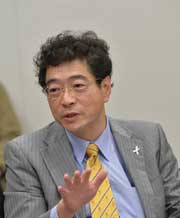Abortion Remains an Unresolved Issue: ICPD25 Meeting next Month
TOKYO, Japan, Oct 09 (IPS) - Currently, the topic of abortion as human rights leaves the world bustling. When the state of Alabama1 in the United States enacted a very strict ban on abortion, it shocked the world. This prompted so-called conservative movements, led by female business owners, to make a full-scale advertisement in the New York Times claiming abortion is a human right2 ; hence the global debate between pro-life and pro-choice.

This discussion is a remnant of the debate at the International Conference on Population and Development (ICPD) in 1994. Twenty Five years into the ICPD and the struggle between opposing views persists, causing the continued disruption in the accessibility of women to reproductive health. This is especially true in developing countries.
The purpose of this paper is to show that pro-life and pro-choice are actually following the same logical development despite failing to arrive at the same conclusion.
Current Status of ICPD and Reproductive Rights
As its name suggests, ICPD is a conference that places population issues in the context of sustainable development, which served as the basis of the current Agenda 2030. However, the population problem has been treated as a value and not a scientific issue. Following this paradigm, possible solutions are unattainable.
Efforts are being made to include abortion in the ICPD Programme of Action (PoA), particularly in paragraphs 5.5., 7.3. and 7.36, which defines Reproductive Rights. The principles behind such effort are that:
- Reproductive rights embrace certain human rights that are already recognized in national laws, international human rights documents and other consensus documents.
- These rights rest on the recognition of the basic right of all couples and individuals to decide freely and responsibly the number, spacing and timing of their children and to have the information and means to do so.
The concept of the reproductive right is not included in the human rights defined by the UN CESCR.
Pro-choice advocates aim to expand the definition of reproductive rights in the ICPD PoA and position the right to abortion in 7.3, which refers to the number of and spacing of children. As such, the right to abortion is not an infringement to self-determination, which is central to the concept of human rights.
Pro-life advocates, on the other hand, regard abortion as infringing on the right to existence of another life, which is a gift from God.
However, it must be recognized that unplanned and unwanted pregnancies also happen. One case in point is the Yazidi girl who got pregnant as a result of sexual assault by members of ISIS. She was alienated from her community causing further victimization of the child. This is just one case and many more are happening in different parts of the world. Such abuse put women and girls in difficult position. How can this kind of problem be addressed?
The basis of human rights is respecting the dignity of human life as part of society regardless of one's race, religion, or culture. Therefore, this contradicts the concept that abortion is a human right. Obviously, no matter how extensive the discussion on this problem could go, no logical solution can be reached. Ergo, it is meaningless to engage in an argument that will always end up in a stalemate.
Possible solution
Reproductive Rights as defined in the ICPD PoA intends to prevent pregnancy in situations where self-determination is not possible – these cases must be devoid of theological debates. Serious discussions and negotiations had been made during the formulation of the ICPD PoA and it can be assumed that a reasonable conclusion was drawn because it was adopted and ratified by many countries.
The debates on abortion may be addressed through a democratic decision-making mechanism. Unless the conditions for achieving reproductive rights are there, such as the meaningful empowerment of women, access to education, improved socioeconomic status, advancement in the field of health - especially in family planning - and full dissemination of reproductive health services, women cannot be held accountable.
Abortion is not a matter that should be recognized as a right yet, but it is an issue that should be treated with the utmost care. Appropriate medical measures must be put in place for situations where the conditions for reproductive rights cannot be met, resulting in an unwanted pregnancy. Otherwise, prolife means denying the life and dignity to human beings who are victims of circumstances.
The suggestion is to separate the issue of abortion from reproductive rights. This way, it will be possible to present a more realistic, reasonable and relevant solution that could be more commonly acceptable.
1https://www.huffpost.com/entry/alabama-senate-abortion-bill-passes_n_5cd9fba1e4b073aa0b3266d9?guccounter=1
2https://forbesjapan.com/articles/detail/27402
© Inter Press Service (2019) — All Rights Reserved. Original source: Inter Press Service

